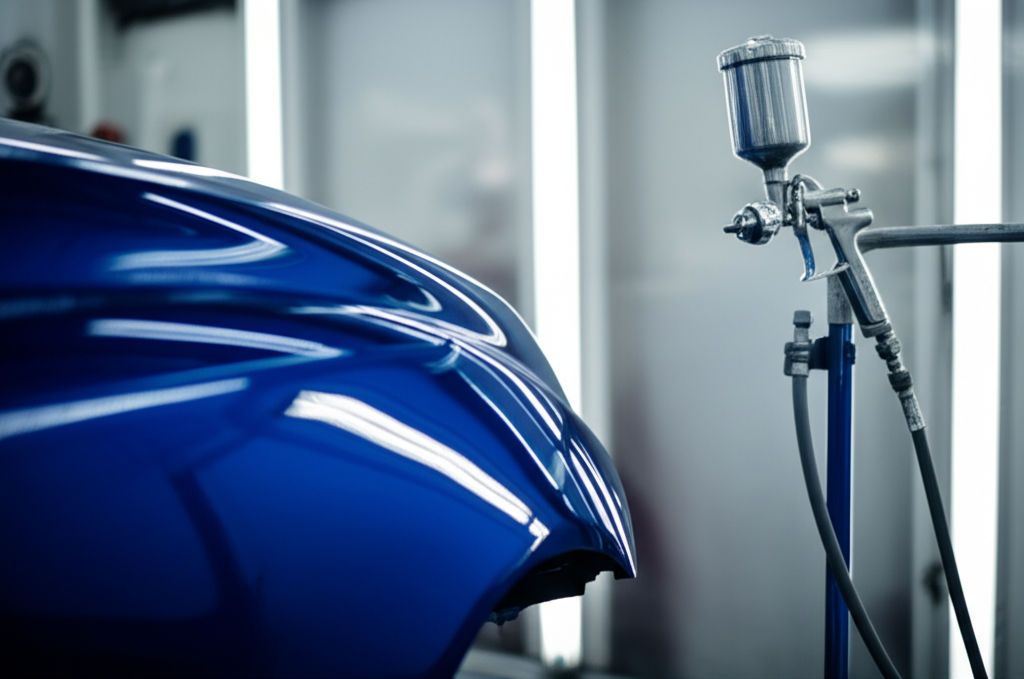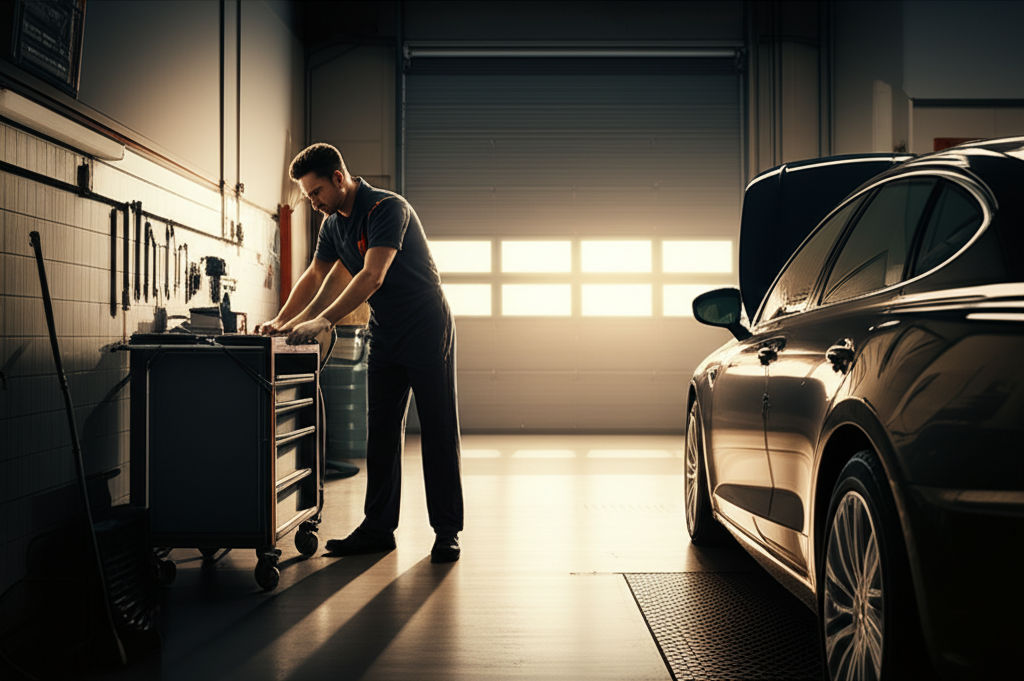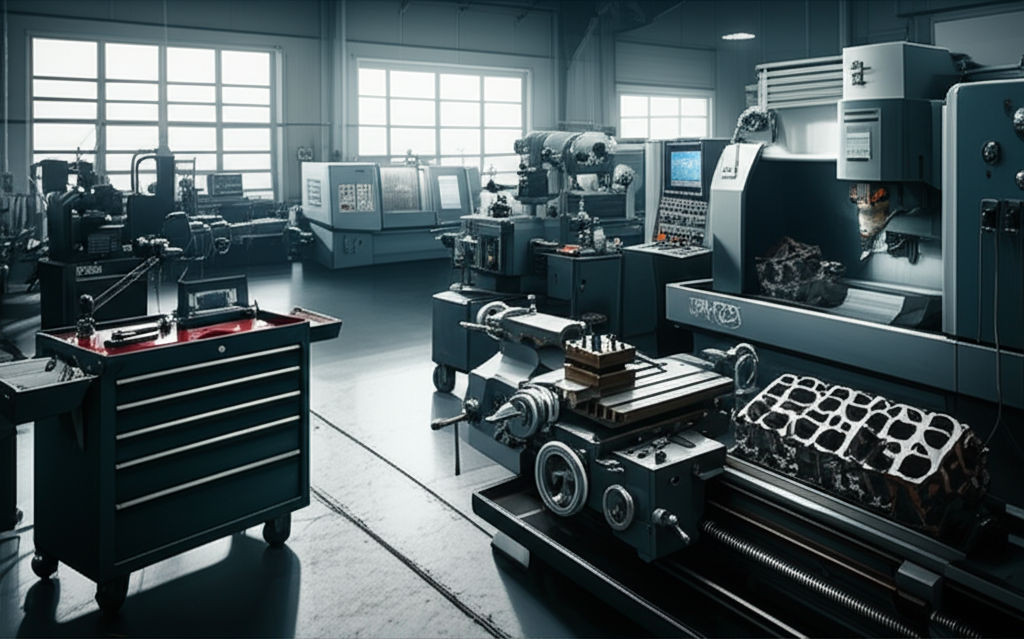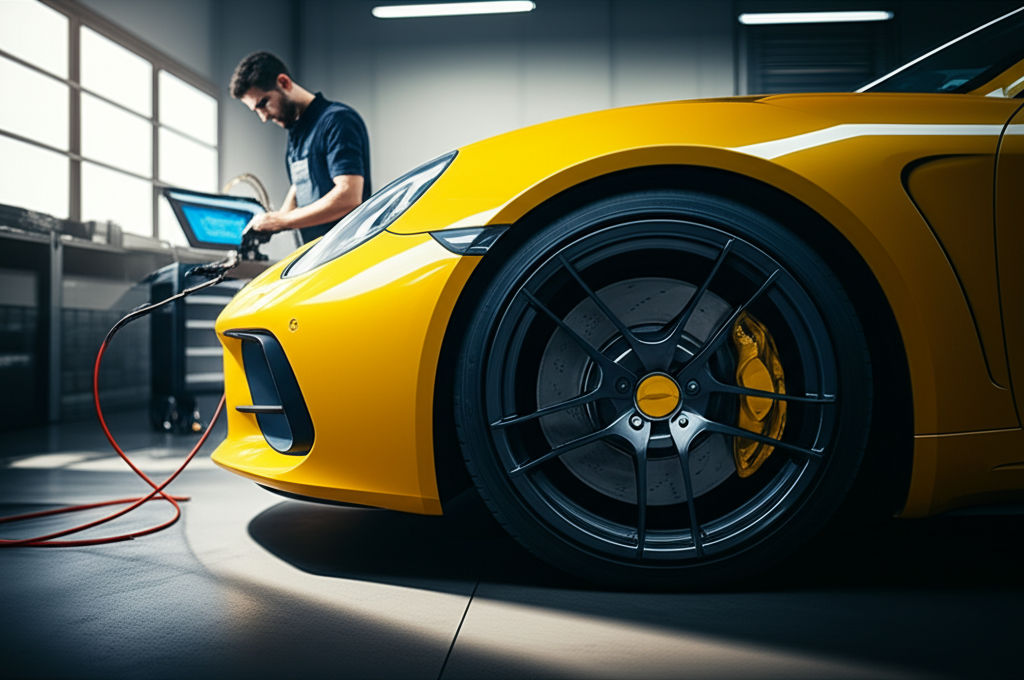Automotive Painter Jobs And How To Get Hired
Ellie Moore

Photo: Drive your career forward! Learn how to get hired as an automotive painter, mastering the art of vehicle refinishing for a rewarding profession.
Drive Your Career Forward: How to Get Hired for Automotive Painter Jobs
The automotive industry is a dynamic and ever-evolving field, where precision, skill, and an eye for detail are highly valued. Among the many specialized roles, the automotive painter stands out as a true artist, transforming damaged vehicles and bringing them back to life with flawless finishes. If you're passionate about cars, have a knack for color, and possess a meticulous approach to your work, an automotive painter job could be your ideal career. This comprehensive guide will navigate you through the ins and outs of this rewarding profession and provide actionable steps on how to get hired.
The Art and Science of Automotive Painting
Automotive painting is far more than just spraying color onto a car; it's a blend of artistry, technical expertise, and scientific understanding. Automotive painters, often referred to as auto body painters or refinishing technicians, are responsible for restoring and enhancing the appearance of vehicles, from minor touch-ups to complete repaints.
What Does an Automotive Painter Do?
An automotive painter's day-to-day tasks are diverse and require a comprehensive skill set. Their primary responsibilities include:
- Surface Preparation: This is arguably the most critical step. Painters must meticulously clean, sand, grind, and fill any imperfections on the vehicle's surface to ensure it's perfectly smooth and ready for paint. This often involves removing existing paint, rust, and old body filler.
- Masking: Protecting areas not intended for paint, such as windows, chrome, and interiors, using masking tape and paper. This precision ensures a clean, professional finish.
- Color Matching and Mixing: A crucial artistic and technical skill, painters must accurately match the new paint color to the vehicle's existing shade, especially for partial repaints. This involves understanding color theory and precisely mixing paints, primers, hardeners, and reducers.
- Application: Applying multiple layers of primers, basecoats, and clearcoats using specialized spray guns (like HVLP sprayers) to achieve a uniform, durable, and high-quality finish.
- Finishing and Detailing: After painting, tasks include wet sanding, buffing, and polishing the painted surfaces to remove any imperfections and achieve a showroom-quality shine. They may also apply undercoating treatments and replace decals.
- Quality Control: Constantly inspecting their work for defects, runs, sags, or inconsistencies to ensure a flawless result.
- Equipment Maintenance: Cleaning and maintaining spray guns, booths, and other painting equipment to ensure optimal performance and longevity.
- Safety Compliance: Adhering to strict safety protocols, including the proper use of personal protective equipment (PPE) and hazardous waste disposal procedures, as the work often involves chemicals and fumes.
Automotive painters typically work in auto body repair shops, dealerships, custom paint shops, or manufacturing facilities.
Why Choose a Career as an Automotive Painter?
A career in automotive painting offers a unique blend of creativity and practical skill, with several compelling benefits:
- High Demand: With a consistent demand for vehicle repair and restoration, the need for skilled automotive painters remains strong. The U.S. Bureau of Labor Statistics projects a steady growth rate for the profession. The automotive paints and coatings market itself is projected to grow significantly, indicating ongoing demand for skilled applicators.
- Rewarding Work: There's immense satisfaction in transforming a damaged vehicle into a gleaming, like-new condition. It's a tangible result of your craftsmanship.
- Competitive Salary: While entry-level salaries may vary, experienced automotive painters can earn a respectable income. As of July 2025, the average annual salary for an Automotive Painter in the United States is around $62,291, with hourly rates averaging $30. Entry-level positions typically start lower, but compensation can increase significantly with experience, skills, and location.
- Job Stability: As long as there are cars on the road, there will be a need for automotive painters to repair collision damage, restore classic vehicles, and customize new ones. The increasing consumer preference for pre-owned and refurbished vehicles also drives demand for automotive paint and coatings.
- Variety of Work: From fixing minor dents and scratches to performing full custom paint jobs or working on different types of vehicles (cars, trucks, buses), the work can be diverse and engaging.
- Advancement Opportunities: With experience and further training, automotive painters can advance to roles such as lead painter, shop foreman, estimator, or even open their own auto body and paint shop.
The Skills You Need to Master
To excel as an automotive painter, you'll need a combination of technical proficiency and essential soft skills.
Technical Skills:
- Color Matching: The ability to precisely match existing vehicle colors or create custom shades. This requires a deep understanding of color theory.
- Surface Preparation: Expertise in sanding, grinding, filling, and cleaning various materials to create a perfect canvas.
- Paint Application Techniques: Proficient use of spray guns (HVLP, airbrushing) for smooth, even, and consistent paint application, including primers, basecoats, and clearcoats.
- Paint Mixing: Accurate measurement and mixing of paint components to achieve the desired color, consistency, and durability.
- Masking Precision: Meticulous application of masking materials to protect untouched areas.
- Buffing and Polishing: Skill in using power tools and compounds to achieve a high-gloss, defect-free finish.
- Understanding of Materials: Knowledge of different paint types (e.g., waterborne coatings), primers, clearcoats, and their properties.
- Minor Repair Skills: Basic auto body repair knowledge, such as minor sanding and grinding, can be beneficial.
- Safety Compliance: Strict adherence to safety protocols for handling hazardous materials and operating equipment.
Soft Skills:
- Attention to Detail: This is paramount. Every imperfection, no matter how small, can compromise the final finish.
- Patience: Automotive painting is a meticulous process that cannot be rushed.
- Good Eyesight and Color Vision: Essential for accurate color matching and identifying subtle flaws.
- Problem-Solving: The ability to troubleshoot issues like paint defects, uneven application, or unexpected challenges during the process.
- Communication Skills: Often, painters interact with customers to understand their needs or explain repair processes.
- Physical Stamina: The job often involves standing for long periods, bending, and working in various positions.
Education and Training Pathways
While a high school diploma is often the minimum requirement, formal training significantly boosts your chances of securing a good automotive painter job.
1. Vocational Schools and Community Colleges:
Many institutions offer specialized automotive collision repair or auto body and paint technology programs that can lead to a certificate or associate's degree. These programs provide hands-on training in:
- Surface preparation techniques
- Paint mixing and color theory
- Spray gun operation and maintenance
- Clearcoat application
- Safety procedures
- Basic auto body repair
A certificate program can typically be completed in one to two years.
2. Apprenticeships:
An apprenticeship is an excellent way to gain hands-on experience while earning a living. You work alongside experienced painters, learning the trade directly. Apprenticeships typically last two to three years and may involve a combination of on-the-job training and theoretical instruction.
3. Manufacturer-Specific Training and Certifications:
Many paint manufacturers, such as PPG and Axalta, offer specialized training and certification programs. These courses focus on their specific paint systems, products, and advanced application techniques. Obtaining such certifications demonstrates your expertise and commitment to using industry-standard products and processes, often a requirement for shops that offer manufacturer warranties.
4. ASE Certification:
The Institute for Automotive Service Excellence (ASE) offers certifications that can validate your skills. While not always mandatory, an ASE certification in refinishing or collision repair can enhance your credibility and marketability.
Building Your Portfolio
In a visual trade like automotive painting, a strong portfolio is your resume. It showcases your skills, attention to detail, and the quality of your work.
- Before-and-After Photos: Document your projects with high-quality "before" and "after" photos. Show the extent of damage and the flawless finish you achieved.
- Variety of Projects: Include diverse examples, from minor touch-ups and panel repaints to full vehicle color changes or custom work.
- Detail Shots: Capture close-ups of your paintwork, highlighting smooth finishes, perfect color matches, and crisp masking lines.
- Highlight Special Skills: If you have experience with specific paint types (e.g., metallic, matte, candy, pearls) or techniques (e.g., airbrushing, pin-striping), showcase them.
- Digital and Physical: Create
Finance & Investment
View All
April 15, 2025
Honda Finance Login Quick Access GuideElevate your brand with expert SEO content. Discover your blueprint for higher rankings, organic traffic, and establishing online authority and trust.
Ellie Moore

June 13, 2025
Harley Davidson Finance for True RidersUnlock online success with expert SEO content. Learn to create high-quality, E-E-A-T-driven content that ranks high, builds trust, and genuinely helps your audi...
Ellie Moore

November 27, 2025
Yahoo Finance Stock Market Guide 2025Unlock online authority & visibility with expert SEO content. Create high-value, E-E-A-T-driven content that builds trust, meets user intent, and ranks.
Ellie Moore

July 5, 2025
What Is DIP Financing in BusinessMaster expert SEO content to build online authority, boost rankings, and grow your business. Create valuable, trustworthy content for users and search engines.
Ellie Moore

May 26, 2025
Business Finance for Poor CreditElevate your SEO with expert content! Learn to create valuable, authoritative, E-E-A-T-driven content for higher rankings, engaged readers, and strong brand cre...
Ellie Moore

April 10, 2025
Auto Financing Calculator for ShoppersDominate search results with expert SEO content. Learn to create valuable, intent-driven content that builds authority and drives organic growth.
Ellie Moore
Insurance
View AllSafeguard your assets with our guide to Complete Safeco Insurance Coverage. Understand options, compare quotes, and get peace of mind.
Ellie Moore
Unpredictable risks threaten your business. Secure comprehensive protection with Complete Business Insurance Plans to safeguard assets, ensure continuity, and f...
Ellie Moore
Concerned about financial risks? Discover how top-rated auto & renters insurance offers optimal protection, savings, and peace of mind for your assets.
Ellie Moore
Safeguard your condo investment! Understand essential HO-6 insurance to cover property, liability, and HOA master policy gaps.
Ellie Moore
Secure optimal insurance protection without overspending. Learn how policyholders and risk managers can get cheap, high-value coverage today.
Ellie Moore
Don't gamble with your finances. Discover essential auto insurance coverage to protect your assets, minimize risk, and gain peace of mind on the road.
Ellie Moore
Education
View AllMicro-credentials are on the rise! Discover how they provide fast, focused skills for today’s learners and reshape education.
Read MorePlay is crucial in early learning! Discover how play-based learning enhances cognitive, emotional, and social development in young children.
Read MoreLearn effective classroom strategies to manage ADHD. Discover how teachers can support students with ADHD for better learning outcomes.
Read MoreTake learning beyond the textbook with experiential education. Discover how real-world experiences create lasting knowledge and skills.
Read MoreOutdoor learning promotes cognitive and social growth. Explore how nature-based education enhances learning outcomes and student well-being.
Read MoreExplore how emotional intelligence impacts academic performance. Learn strategies to help students develop emotional skills for better learning outcomes.
Read MorePopular Post 🔥
View All
1
2
3
4
5
6
7
8
9
10
Health






Automotive
View All
August 20, 2025
Best Automotive Subwoofer Picks This Year
Transform your car audio! Discover the best automotive subwoofers for deep bass & immersive sound. Get expert picks & choose your ideal car subwoofer.

August 17, 2025
Automotive Record Player A Retro Ride Upgrade
Upgrade your ride with a retro automotive record player! Experience the warm, rich sound of in-car vinyl for a truly unique analog journey.

August 12, 2025
Village Automotive Friendly Local Car Experts
Discover why local village automotive experts offer unmatched personalized care, trust, and expertise for your car. Choose community-focused auto service.

July 28, 2025
Mayse Automotive Services For Every Vehicle Type
Mayse Automotive: Your trusted partner for comprehensive care across all vehicle types. Expert, certified technicians & advanced tools ensure smooth driving.

July 23, 2025
Find Reliable Automotive Machine Shops Near Me
Locate top automotive machine shops for engine repair. Ensure your vehicle's performance, longevity, and save money with expert engine services.

August 22, 2025
Dannys Automotive Fast Reliable Service
Danny's Automotive offers fast, reliable service. Get expert vehicle care combining speed with precision and trust, without compromising your schedule.

















